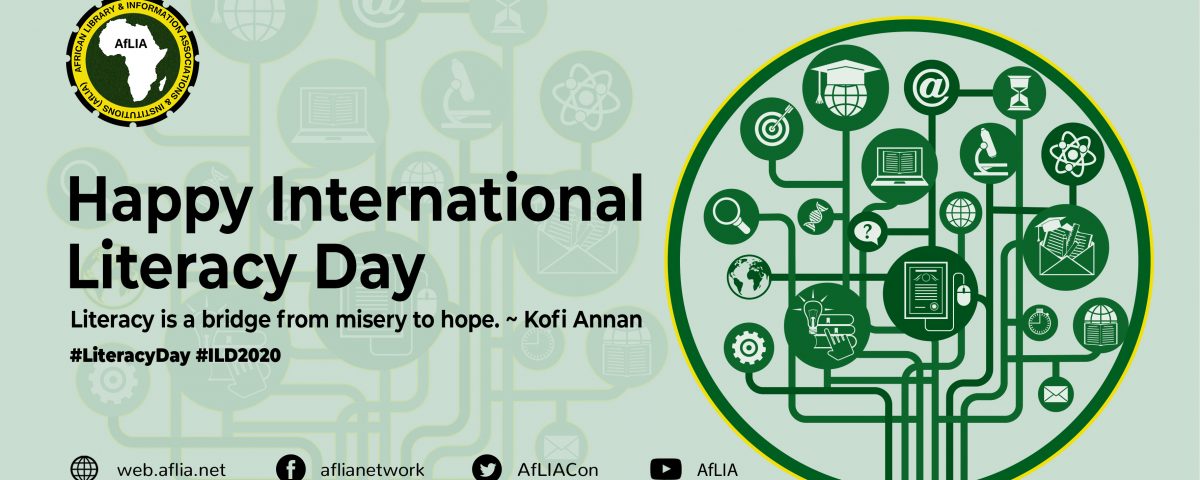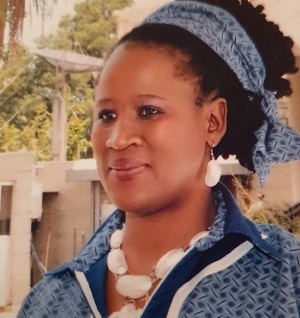Literacy teaching and learning in the COVID-19 crisis and beyond – 2020 International Literacy Day

8 SEPTEMBER, 2020
September 8th is the International Literacy Day. Since 1966, the Day has been set aside by UNESCO to highlight the importance of literacy. This year’s theme – “Literacy teaching and learning in the COVID-19 crisis and beyond” is critical for librarians as the new normal continues to cause heavy migration of learning and reading activities to online spaces. The COVID-19 crisis has affected the digital gap as pertains to teaching and learning in Africa in several ways. Schools at different levels of education have gone online. Primary school pupils are given assignments online with no prior teaching on netiquette and/or how to stay in online spaces. Internet penetration in Africa is 39.3%. What happens to children without internet-enabled devices in their homes especially those in rural and unserved communities all over Africa? It is estimated that the average cost of 1GB of data in Africa is 7.12% of average income in some countries, while is 20% in some countries. What happens to children whose parents are low income earners hence, cannot afford data to ensure that their children attend all online classes? On the other hand, teachers are expected to create online teaching materials and use different platforms to communicate and teach their students with non-existent or little self-taught digital skills-set.
These scenarios created by the COVID-19 crisis exacerbate the already wide digital divide in Africa, have great capacity to increase the bludgeoning number of out of school children in the continent as well as hinder teaching and learning through educational divide. Beyond that, they have negative implications for the future of young people in Africa who need to be equipped for the digital economy and workplaces. Libraries can assist greatly in mitigating the digital gap and educational divide through various pathways. All over the world, community and public libraries serve as open classrooms where children, young adults and lifelong learners can access learning materials and space for studying irrespective of economic status, religious beliefs and social classes and/or inclinations. Academic and school libraries play the same roles in their different educational institutions. Libraries also teach digital skills as they expose their users to tools and platforms for learning and creating content online.AfLIA sought the views of librarians across Africa to understand the roles that libraries can play in Literacy teaching and learning in the COVID-19 crisis and beyond. Responses are from Mali, Botswana and Madagascar.

According to Souleymane Sogoba, a librarian and archivist at Rural Development Sector Planning and Statistics Unit (CPS / SDR) Mali, “the library, is the third most frequented place for many people in the 21st century. Libraries can play a huge role in bridging the digital divide in Africa through; – the initiation of media and information literacy programmes, the integration of games in learning at school and in libraries, facilitating access to reliable information on research platforms, development of digital content based on African realities and local languages, develop partnerships with startups to introduce children to coding and digital learning as well as the introduction of distance learning digital literacy courses when the face to face interactions do not work.”

We asked how libraries can inculcate the literacy skills and competencies needed for learning and teaching in this era. Dr. Ayanda A. B. Lebele, Head, Botswana International University of Science and Technology Library answered. She thinks that skills building of information “contact torch bearers” in social networks is a pathway that can be explored. She opines that registered active library users can serve as torch bearers or information mediators to non-users in their social networks. “This approach would grow the concept of library ambassadors or faculty representatives”. She goes on to point out that” Information Literacy Skills teaching should be broadened beyond imparting skills needed for teaching; learning and research to include building skills to empower communities in the library user’s networks. This is critical so that the skills can be acquired by all to cope with teaching and learning in the COVID-19 crisis and beyond. Trained torch bearers will help their networks to critically evaluate information. The users need skills to unpack; translate and interpret information in socially relevant ways.” These library “contact tracing touch bearers” need information leadership skills coupled with internet etiquette skills so as to add value to non-academic social groups.

However, Willy Rahetilahy – Tafaray Library Association of Madagascar – is of the view that the present number of public and school libraries in Africa is not enough to effectively play the well-understood roles of libraries in bridging the digital gap in the continent. According to him, the creation and increase of these institutions should be taken as a priority by government authorities and communities who can afford to set up libraries. “This is important because the doors of these libraries are open to all in their different community whether rich or poor to learn and catch up with school work as well as gain access to the internet and get digital skills for more learning and exploitation of opportunities.” He went on further to advocate for more collaborations and networking among African libraries, teachers, parents and user communities so that they can help out each other in Literacy teaching and learning in the COVID-19 crisis and beyond.
More than ever, the need for vibrant, equipped library systems in Africa for unserved rural communities has become most crucial. Not everyone can buy Internet enabled devices, not every home can afford data and electricity, not every teacher has the digital skills to produce online materials or point to online resources for further reading for students but equipped libraries in Africa’s urban and rural areas can make the difference in bridging the digital and educational gaps being widened by the COVID-19 crisis.
Read more exciting articles here: AFRICAN LIBRARY VIBES
Want to learn how to contribute an interesting story or article to African Library Vibes? CLICK HERE TO CHECK OUT HOW TO DO SO.
